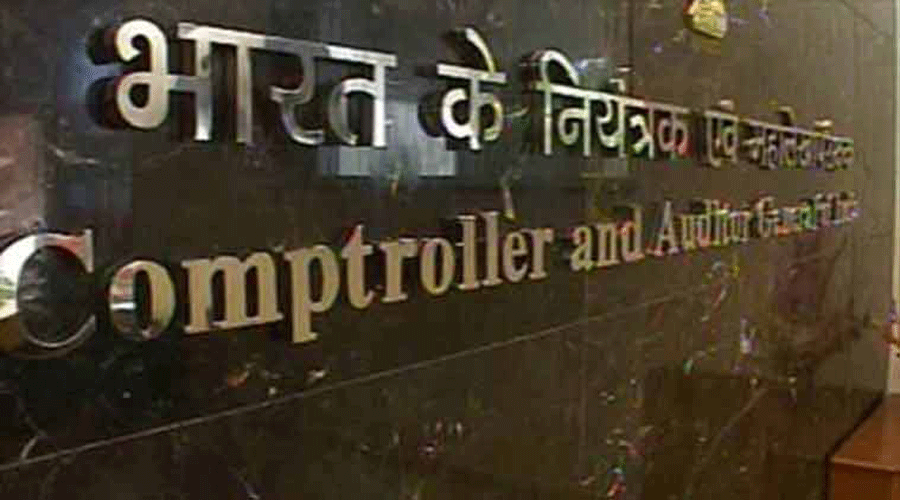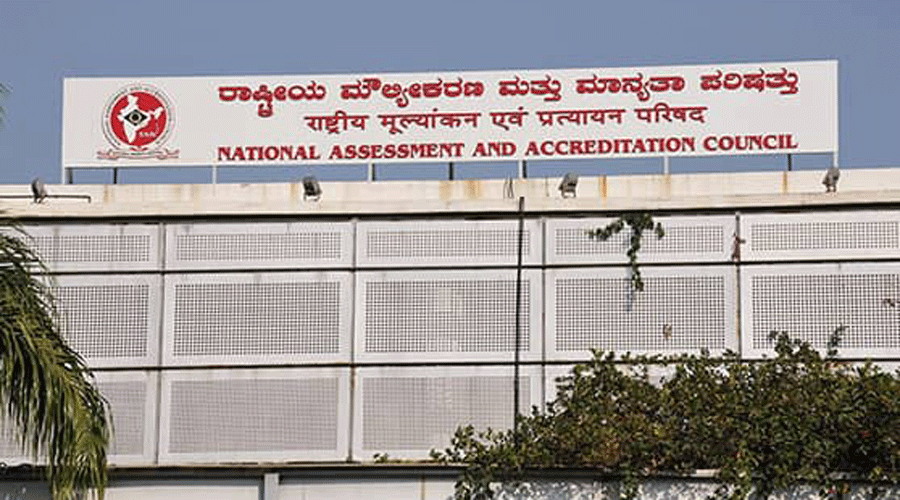An expert panel and the comptroller and auditor general have questioned the competence and transparency of the process that accredits and grades India’s institutions of higher learning, amid allegations from academics that private universities are largely favoured over their government counterparts.
The expert committee, headed by J.P. Singh Joorel, director of the governmentinformation and library network Inflibnet, had been formed last July to study the processes of assessment and accreditation conducted by the apex National Assessment and Accreditation Council (NAAC).
It has raised questions about the high grades given to some institutions, the competence of private agencies hired by the NAAC to verify the institutions’ claims about their infrastructure and excellence, and the excessive allotments of assignments to certain agencies and assessors.
The CAG has underlined that many institutions received positive remarks but poor scores from the assessors while it was the opposite with others.
Two academics told this newspaper about anecdotal complaints of corruption relating to private institutions and private data verifiers, and suggested that the government perhaps did not mind its own institutions gettingpoor grades since it was promoting the privatisation of education.
Bhushan Patwardhan, then chairman of the NAAC’s executive committee, received the expert committee’s report in September and sent it tothe Union education ministry and University Grants Commission chairperson M. Jagadesh Kumar, seeking their advice.
Sources said the executive committee was informed about the report in January this year and all its members were advised to take serious note of it.
The CAG’s findings are stated in a communication that it sent to the NAAC director last October, seeking the organisation’s response.
The Telegraph has been made privy to the contents of both the expert panel report and the CAG communication.
Grading process
The NAAC accredits universities and colleges by awarding them grades based on their cumulative grade point average (CGPA) score. The process involves multiple stages.
First, the institutions upload on a dedicated NAAC portal their own Self Study Reports that provide data on their student and teacher strength, teacher qualifications, infrastructure, research output, curricula, exam results and other parameters on which they are to be assessed for accreditation.
This is sent to an NAAC coordinator as well as a Data Verification and Validation (DVV) “partner” — an agency engaged by the NAAC that verifies through queries or online research all the information in the Self Study Reports.
These agencies include private companies such as data analytics firms as well as government institutions such as IITs.
The next step is a physical inspection of the institution through a Peer Team Visit (PTV), whose members are NAAC-assigned experts. They also interact with the teachers and students. The peer teams assess the institution on multiple “matrices”, assigning a score between 0 and 4 on each matrix. A standing committee scrutinises the entire process.
Seventy per cent weightage is given to the DVV and 30 per cent to the PTV report during grading.
The Joorel report made the following points:
■ While the NAAC selects the DVV partners, it does not make sure they have the necessary technical qualifications and professional competence relating to “higher education knowledge systems”. Nor is there a mechanism to train or guide them.
■ Some institutions received “hyped values or wrong values”, that is, higher grades than they deserved.
■ The allocation of Self Study Reports to the coordinators and DVV partners is not sequential or random. When 14 Self Study Reports were allotted on October 28, 2021, a full dozen of them were sent to a single DVV partner and just two to another.
■ Many experts are too frequently picked for Peer Team Visits.
■ The communications among the coordinators, DVV partners and the educational institutions — for instance, queries about the institutions’ claims or the accuracy ofthe DVV partner’s verification process — are not recordedon the portal, leading to opacity.
■ The resolutions of issues raised by coordinators are not communicated back to the coordinators concerned.
■ Appeals by institutions against the final grades have often prompted the NAAC’s appeals committee to recommend a fresh DVV or PTV, and the revised grades have diverged drastically from the original ones. Such situations owe to poor performance by the original DVV partner or PTV team, and action should be taken against the erring parties.
■ The NAAC lacks a secure data centre of its own, which means the information provided by the institutions is liable to be modified later.
CAG findings
The CAG examined the peer team reports and matrix-wise scores of 133 select institutions and found that in the case of 20 institutions, the points awarded on key indicators did not match the contents of the report. In the case of another 21 institutions, high scores of 3 and 4 were awarded without citing the justification.
For example, it said, the Mahant Shri Ramjanki Sharan Das Vaishnav Government Snatak College in Kabirdham district of Chhattisgarh was awarded a score of 1 by the peer team on the matrix of Special Programmes for Advanced Learners and Slow Learners.
However, the peer team report makes no negative comment. It says the college assesses the learning levels of the students and organises special classes for slow learners. The college received an overall CGPA score of 1.94 with a C grade in 2022.
In contrast, the peer team awarded the highest possible 4 points to PSGR Krishnammal College for Women,Coimbatore, on the matrix of Strategies for Mobilisation of Funds.
However, the peer team’s report says the college should ensure judicial and optimum utilisation of resources and that it has been unable to attract funds in larger amounts from NGOs, individuals and philanthropists.
The college was awarded an overall GPA score of 3.71 with the highest grade of A++ in 2021.
The CAG has also found that the NAAC failed to use the expertise of 1,310 assessors (prospective peer team members) between July 2017 and October 4, 2022, even after training them on the assessment process. Yet, 668 untrained assessors were deputed for Peer Team Visits.
Corruption whiff
Two senior academics told this newspaper that the involvement of private DVV partners opens the door to corruption.
“If people from universities and colleges are involved, the chances of corruption are far less. Because these institutions are largely more accountable. But such transparency cannot be expected from private agencies,” Abdul Wahid, former vice-chancellor of the Central University of Kashmir, who was associated with the NAAC’s accreditation process in the past, said.
Another academic, who didn’t want to be quoted, said there were complaints about peer team members asking for costly gifts and other favours.
“Private institutions can fulfil all kinds of demands from the assessors. Government institutions are bound by rules and cannot divert any fund for such appeasement. Such dealings very often reflect on the accreditation score,” the academic said.
This newspaper had filed an RTI application before the NAAC seeking the names of all the DVV partners. In its response on December 26 last year, the NAAC named seven DVV partners.
These were IIIT Design and Manufacturing (IIITDM), Kurnool; Eduvantage Private Limited, Delhi; Promarc Software Private Ltd, Nagpur; Crisil Ltd, Mumbai; National Institute of Technical Teachers’ Training and Research, Chennai; IIITDM Kancheepuram; and IIT Chennai.
Emails were sent to NAAC director S.C. Sharma seeking his reactions to the concerns expressed by the expert panel and the CAG. Sharma said he was unaware of the findings of the expert panel’s report.
“Till date the committee has not submitted the report formally shared with NAAC… As Director of the NAAC or as Member Secretary of the EC, I do not have any information about the report,” Sharma wrote.
On the institutional mechanism to check discrepancies between peer reports and scores, Sharma said: “There is a standard mechanism (for checking discrepancies) in place from submission of Self Study Report by HEI (higher education institution) till declaration of results… Clarification to the queries raised (by) the CAG have already been addressed by NAAC.”
He said the DVV partners are selected on the basis of e-tenders in keeping with government norms. A technical scrutiny of the organisation’s technological proficiency and experience, and details of its employees and their academic profiles, is carried out.
Sharma is yet to share details of the technical proficiency of all the DVV partners, as sought by this newspaper.
On the expert committee’s reservations relating to the allotment of Self Study Reports to DVV partners and the selection of experts for PTVs, Sharma wrote: “The entire NAAC process involves several challenges and parameters and based on the experience gained NAAC keeps improving the process with the approval of EC (executive committee).”












